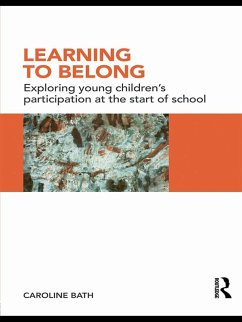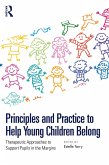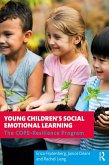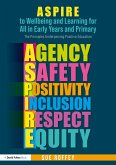Caroline Bath
Learning to Belong (eBook, PDF)
Exploring Young Children's Participation at the Start of School
47,95 €
47,95 €
inkl. MwSt.
Sofort per Download lieferbar

24 °P sammeln
47,95 €
Als Download kaufen

47,95 €
inkl. MwSt.
Sofort per Download lieferbar

24 °P sammeln
Jetzt verschenken
Alle Infos zum eBook verschenken
47,95 €
inkl. MwSt.
Sofort per Download lieferbar
Alle Infos zum eBook verschenken

24 °P sammeln
Caroline Bath
Learning to Belong (eBook, PDF)
Exploring Young Children's Participation at the Start of School
- Format: PDF
- Merkliste
- Auf die Merkliste
- Bewerten Bewerten
- Teilen
- Produkt teilen
- Produkterinnerung
- Produkterinnerung

Bitte loggen Sie sich zunächst in Ihr Kundenkonto ein oder registrieren Sie sich bei
bücher.de, um das eBook-Abo tolino select nutzen zu können.
Hier können Sie sich einloggen
Hier können Sie sich einloggen
Sie sind bereits eingeloggt. Klicken Sie auf 2. tolino select Abo, um fortzufahren.

Bitte loggen Sie sich zunächst in Ihr Kundenkonto ein oder registrieren Sie sich bei bücher.de, um das eBook-Abo tolino select nutzen zu können.
This fascinating book draws on a diversity of disciplines exploring the importance of participatory approaches to children's early education and shows how fostering a sense of identity is essential to early learning.
- Geräte: PC
- mit Kopierschutz
- eBook Hilfe
- Größe: 2.47MB
Andere Kunden interessierten sich auch für
![Principles and Practice to Help Young Children Belong (eBook, PDF) Principles and Practice to Help Young Children Belong (eBook, PDF)]() Principles and Practice to Help Young Children Belong (eBook, PDF)29,95 €
Principles and Practice to Help Young Children Belong (eBook, PDF)29,95 €![Young Children's Social Emotional Learning (eBook, PDF) Young Children's Social Emotional Learning (eBook, PDF)]() Erica FrydenbergYoung Children's Social Emotional Learning (eBook, PDF)24,95 €
Erica FrydenbergYoung Children's Social Emotional Learning (eBook, PDF)24,95 €![The Sustained Shared Thinking and Emotional Well-being (SSTEW) Scale (eBook, PDF) The Sustained Shared Thinking and Emotional Well-being (SSTEW) Scale (eBook, PDF)]() Iram SirajThe Sustained Shared Thinking and Emotional Well-being (SSTEW) Scale (eBook, PDF)20,95 €
Iram SirajThe Sustained Shared Thinking and Emotional Well-being (SSTEW) Scale (eBook, PDF)20,95 €![Children's Learning in Laboratory and Classroom Contexts (eBook, PDF) Children's Learning in Laboratory and Classroom Contexts (eBook, PDF)]() Joseph CampioneChildren's Learning in Laboratory and Classroom Contexts (eBook, PDF)47,95 €
Joseph CampioneChildren's Learning in Laboratory and Classroom Contexts (eBook, PDF)47,95 €![Children's Interests, Inquiries and Identities (eBook, PDF) Children's Interests, Inquiries and Identities (eBook, PDF)]() Helen HedgesChildren's Interests, Inquiries and Identities (eBook, PDF)37,95 €
Helen HedgesChildren's Interests, Inquiries and Identities (eBook, PDF)37,95 €![Encounters With Materials in Early Childhood Education (eBook, PDF) Encounters With Materials in Early Childhood Education (eBook, PDF)]() Veronica Pacini-KetchabawEncounters With Materials in Early Childhood Education (eBook, PDF)39,95 €
Veronica Pacini-KetchabawEncounters With Materials in Early Childhood Education (eBook, PDF)39,95 €![ASPIRE to Wellbeing and Learning for All in Early Years and Primary (eBook, PDF) ASPIRE to Wellbeing and Learning for All in Early Years and Primary (eBook, PDF)]() Sue RoffeyASPIRE to Wellbeing and Learning for All in Early Years and Primary (eBook, PDF)20,95 €
Sue RoffeyASPIRE to Wellbeing and Learning for All in Early Years and Primary (eBook, PDF)20,95 €-
-
-
This fascinating book draws on a diversity of disciplines exploring the importance of participatory approaches to children's early education and shows how fostering a sense of identity is essential to early learning.
Dieser Download kann aus rechtlichen Gründen nur mit Rechnungsadresse in A, B, BG, CY, CZ, D, DK, EW, E, FIN, F, GR, HR, H, IRL, I, LT, L, LR, M, NL, PL, P, R, S, SLO, SK ausgeliefert werden.
Produktdetails
- Produktdetails
- Verlag: Taylor & Francis
- Seitenzahl: 128
- Erscheinungstermin: 26. März 2009
- Englisch
- ISBN-13: 9781134014538
- Artikelnr.: 43070061
- Verlag: Taylor & Francis
- Seitenzahl: 128
- Erscheinungstermin: 26. März 2009
- Englisch
- ISBN-13: 9781134014538
- Artikelnr.: 43070061
- Herstellerkennzeichnung Die Herstellerinformationen sind derzeit nicht verfügbar.
Caroline Bath is Senior Lecturer in Early Childhood Studies at Sheffield Hallam University.
Introduction 1. Planning the project: Theory and practice in the classroom
The schools The aims and questions The approaches: i. participatory action
research ii. Ethnography The methods Participatory techniques with children
Summary 2. What does it mean to belong: Belonging in English education
Critical pedagogy in the early years The problem with 'participation'
Theories of democracy Democracy, participation and education Summary 3.
Participation in early childhood education: The early years classroom as a
site for participation Listening to children and beyond Participation in
recent early childhood policy Participation and early childhood curriculum
Summary 4. Participatory work at the start of school: Studying young
children The role of the researcher The role of the teacher The role of the
child Children's Perspectives Summary 5. What am I good at?: Introduction
Competence Mastery You mean working as a team? Summary 6. Who's my friend?:
Loyalty and love The importance of care Playing at playing together Summary
7. Who's in charge?: Doing as you're told? Making Decisions You're not
coming to my party Summary 8. What am I allowed to do?: Routines and
rituals Bending and unbending the rules The pattern of narrative Summary
9. How to plan for participation: Introduction Participatory methods
Participatory practices Participatory projects Planning for participation
Conclusion References
The schools The aims and questions The approaches: i. participatory action
research ii. Ethnography The methods Participatory techniques with children
Summary 2. What does it mean to belong: Belonging in English education
Critical pedagogy in the early years The problem with 'participation'
Theories of democracy Democracy, participation and education Summary 3.
Participation in early childhood education: The early years classroom as a
site for participation Listening to children and beyond Participation in
recent early childhood policy Participation and early childhood curriculum
Summary 4. Participatory work at the start of school: Studying young
children The role of the researcher The role of the teacher The role of the
child Children's Perspectives Summary 5. What am I good at?: Introduction
Competence Mastery You mean working as a team? Summary 6. Who's my friend?:
Loyalty and love The importance of care Playing at playing together Summary
7. Who's in charge?: Doing as you're told? Making Decisions You're not
coming to my party Summary 8. What am I allowed to do?: Routines and
rituals Bending and unbending the rules The pattern of narrative Summary
9. How to plan for participation: Introduction Participatory methods
Participatory practices Participatory projects Planning for participation
Conclusion References
Introduction 1. Planning the project: Theory and practice in the classroom
The schools The aims and questions The approaches: i. participatory action
research ii. Ethnography The methods Participatory techniques with children
Summary 2. What does it mean to belong: Belonging in English education
Critical pedagogy in the early years The problem with 'participation'
Theories of democracy Democracy, participation and education Summary 3.
Participation in early childhood education: The early years classroom as a
site for participation Listening to children and beyond Participation in
recent early childhood policy Participation and early childhood curriculum
Summary 4. Participatory work at the start of school: Studying young
children The role of the researcher The role of the teacher The role of the
child Children's Perspectives Summary 5. What am I good at?: Introduction
Competence Mastery You mean working as a team? Summary 6. Who's my friend?:
Loyalty and love The importance of care Playing at playing together Summary
7. Who's in charge?: Doing as you're told? Making Decisions You're not
coming to my party Summary 8. What am I allowed to do?: Routines and
rituals Bending and unbending the rules The pattern of narrative Summary
9. How to plan for participation: Introduction Participatory methods
Participatory practices Participatory projects Planning for participation
Conclusion References
The schools The aims and questions The approaches: i. participatory action
research ii. Ethnography The methods Participatory techniques with children
Summary 2. What does it mean to belong: Belonging in English education
Critical pedagogy in the early years The problem with 'participation'
Theories of democracy Democracy, participation and education Summary 3.
Participation in early childhood education: The early years classroom as a
site for participation Listening to children and beyond Participation in
recent early childhood policy Participation and early childhood curriculum
Summary 4. Participatory work at the start of school: Studying young
children The role of the researcher The role of the teacher The role of the
child Children's Perspectives Summary 5. What am I good at?: Introduction
Competence Mastery You mean working as a team? Summary 6. Who's my friend?:
Loyalty and love The importance of care Playing at playing together Summary
7. Who's in charge?: Doing as you're told? Making Decisions You're not
coming to my party Summary 8. What am I allowed to do?: Routines and
rituals Bending and unbending the rules The pattern of narrative Summary
9. How to plan for participation: Introduction Participatory methods
Participatory practices Participatory projects Planning for participation
Conclusion References







